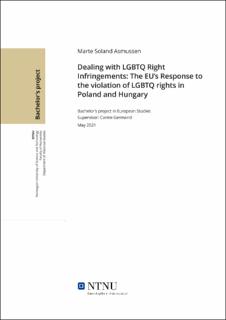| dc.contributor.advisor | Germond, Carine | |
| dc.contributor.author | Asmussen, Marte Soland | |
| dc.date.accessioned | 2021-09-13T16:09:25Z | |
| dc.date.available | 2021-09-13T16:09:25Z | |
| dc.date.issued | 2021 | |
| dc.identifier | no.ntnu:inspera:80491188:46845677 | |
| dc.identifier.uri | https://hdl.handle.net/11250/2775759 | |
| dc.description.abstract | Den Europeiske Union (EU) har i løpet av de siste tiårene vokst fram som en av de mest prominente aktørene som fremmer lesbiske, homofile, biseksuelle og transseksuelle (LGBT) personers rettigheter på verdensbasis. Over det siste tiåret har EU imidlertid måttet hanske med en økende grad av motstand fra enkelte av sine egne medlemsland. Som økningen i negative holdninger mot LGBT-personer i stater som Polen of Ungarn viser, kan man ikke lenger anta at medlemsstater skal holde seg tro til Unionens grunnleggende verdier. Denne oppgaven har til hensikt å se nærmere på EUs reaksjoner på rettighetsbruddene mot LGBT-personer i Polen og Ungarn, og hvorvidt Unionens reaksjoner har vært tilfredsstillende med tanke på å begrense og forhindre slike situasjoner fra å oppstå i framtiden.
Med antakelsen om at EU inntar en normativ rolle i å fremme LGBT-rettigheter globalt, vil denne oppgaven bruke Manners’ Normative Power Europe (NPE)-teori og spredning av normer til å presentere en casestudie av EUs svar på rettighetsbruddene mot LGBT- minoriteter i Polen og Ungarn. Funnene som blir gjort i denne oppgaven viser at disse utviklingene er tett knyttet til de nasjonalistiske, konservative og heteronormative diskursene som blir fremmet av myndighetene i begge stater. De politiske bevegelsene har dessuten sterke tilknytninger til “anti-gender” kampanjene som har spredt seg over hele verden i løpet av det siste tiåret.
Oppgaven vil så se nærmere på verktøyene EU har tilgjengelig når medlemsstater velger å gå imot Unionens normer og verdier med vilje. Som de tilgjengelige alternativene avslører, gjør den institusjonelle sammensetningen og de normative motsetningene innad i Unionen, prosessen å straffe ustyrlige stater vanskelig å navigere. Casen med Polen og Ungarn viser at EU mislykkes med å nå sitt fulle potensiale som en normativ makt - mye takket være Unionens selvmotsigende krav og praksiser. Samtidig er det vanskelig å se tydelig hvorvidt EU i egentlig har andre (realistiske) muligheter tilgjengelige med dagens lover og institusjonelle rammeverk. | |
| dc.description.abstract | The European Union (EU) has over the last decades emerged as one of the most prominent actors in the promotion of lesbian, gay, bisexual and transgender (LGBT) rights worldwide. In the last decade, however, the Union has faced increased resistance from some of its own member states. As the increase in negative attitudes towards LGBT people in states such as Poland and Hungary shows, the member states’ adherence to the founding values of the Union can no longer be presumed. This thesis aims to explore the EU’s response to the LGBT rights violations in Poland and Hungary, and to what extent the Union’s response has been adequate when it comes to limiting and preventing such situations from happening in the future.
With the assumption that the EU plays a normative role in promoting LGBT rights globally, this thesis will with help of the Normative Power Europe (NPE) theory and norm diffusion provide a case study of the EU’s response to the violations against LGBT minorities in Poland and Hungary. The findings in this thesis show that these developments are closely linked to the nationalist, conservative and heretonormative discourses fronted by the government in both countries. Moreover, these political movements have close ties to the anti-gender campaigns that have spread across the world in the past decade.
The thesis will then have a look at the tools available to the EU when member states purposefully go against the norms and values that are promoted by the Union. As the available options reveal, the institutional makeup and the normative inconsistencies within the Union itself, makes the process of punishing “rogue” states difficult to navigate. The case of Poland and Hungary shows that the EU is failing to reach its full potential as a normative power - much due to its inconsistent demands and practices. At the same time, it is hard to see clearly whether the EU really has any other (realistic) options available with the current legislative and institutional framework. | |
| dc.language | eng | |
| dc.publisher | NTNU | |
| dc.title | Dealing with LGBTQ Right Infringements: The EU’s Response to the violation of LGBTQ rights in Poland and Hungary | |
| dc.type | Bachelor thesis | |
